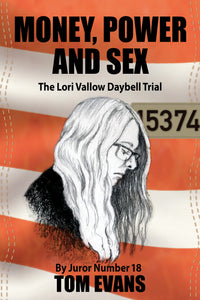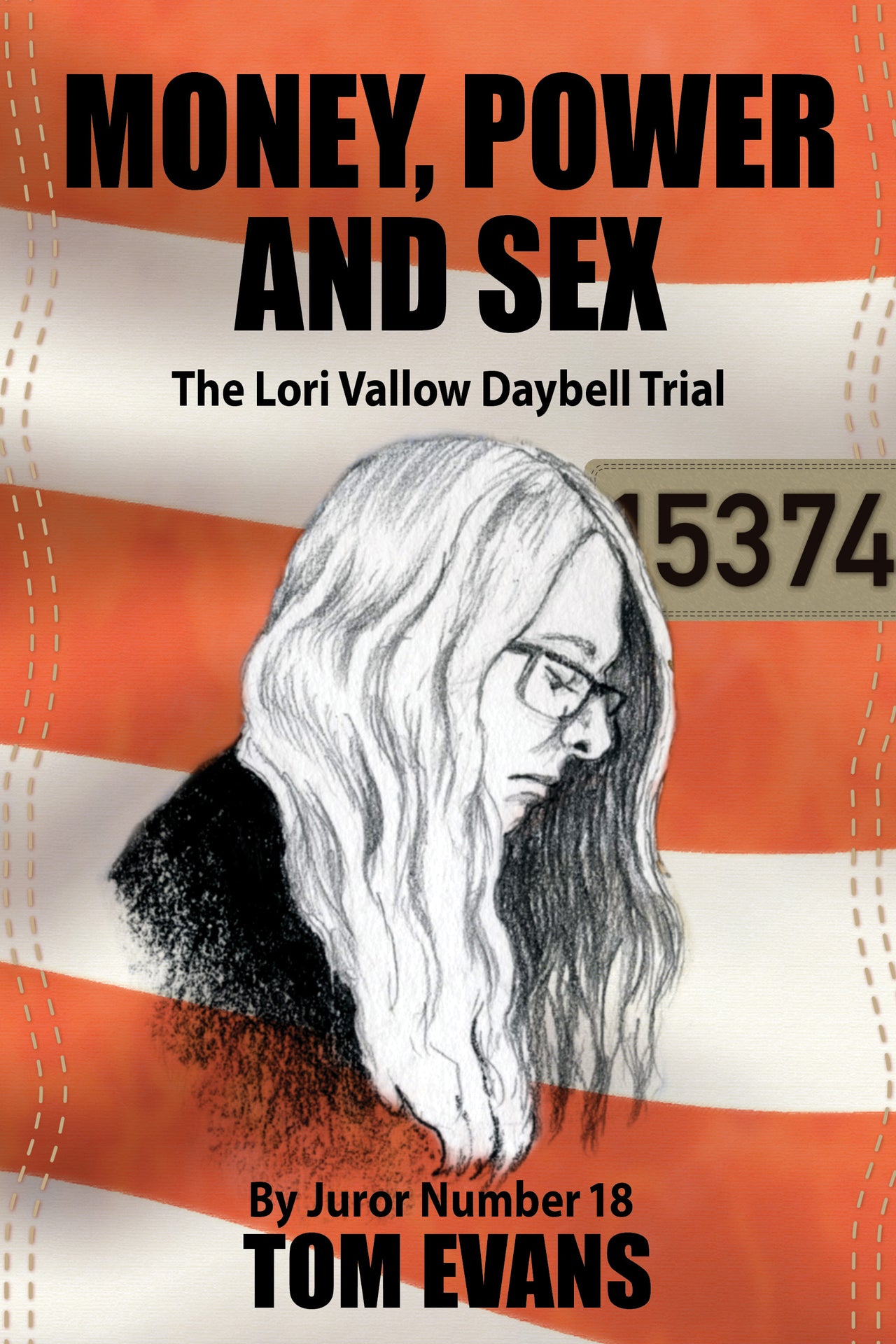Money, Power, and Sex: The Lori Daybell Trial
$17.95USD
$19.95
sale


<?xml version="1.0" encoding="utf-8"?>
<!DOCTYPE html PUBLIC "-//W3C//DTD XHTML 1.1//EN"
"http://www.w3.org/TR/xhtml11/DTD/xhtml11.dtd">
<html xmlns="http://www.w3.org/1999/xhtml">
<head>
<title>Untitled</title>
<meta http-equiv="content-type" content="text/html; charset=iso-8859-1"/>
<style>
/* ePub CSS */
h1 {padding-top: 15%;}
.indent {text-indent: 5%;}
.center {text-align: center;}
.right {text-align: right;}
.margin {margin: 0 5%;}
.margin-indent {margin: 0 5%; text-indent: 5%;}
.bigmargin {margin: 0 5% 0 10%;}
.bigmargin-indent {margin: 0 5% 0 10%; text-indent: 5%;}
.hugemargin {margin: 0 5% 0 15%;}
.hugemargin-indent {margin: 0 5% 0 15%; text-indent: 5%;}
img {max-width: 94%;}
body {margin: 0 3%; text-align: justify;}
.spacer {padding-bottom: 1em;}
</style>
</head>
<body>
<h1 class="center" id="c3">CHAPTER 1: <br/>WAIT, WHAT? (JURY SELECTION)</h1>
<div class="spacer"></div>
<div class="center"><img src="https://cdn.shopify.com/s/files/1/0301/3604/1571/files/f1.jpg?v=1725028638" alt=""/></div>
<div class="spacer"></div>
<div class="spacer"></div>
<div class="indent">When I got the letter in the mail kindly suggesting that I show up for jury duty, I had no idea what the trial would be or how big it was. I still didn’t even suspect it when I showed up at the courthouse. I was put in a room with a lot of other people, and I guess I should have had a clue then, but I just thought it was business as usual at the Ada County Courthouse in Boise, Idaho. There were trials to be tried and they needed jurors to try them.</div>
<div class="indent">I was given a number. My number was 1864, but I didn’t think that meant I was number 1864 out of what someone later said was 2400 total jurors called in for this case. I’ve heard there were 1800, 2400, and 2600 initial calls out to potential jurors. All three of those numbers came from people I thought should know. Whichever number it was, it was a lot of people called for jury service in this case. Serving on a jury was my duty as a citizen and I would do as they asked.</div>
<div class="indent">What they asked of me first was to fill out a questionnaire. It was pretty generic and still didn’t clue me in to what I might be in for. That was it for Day One. A few days later, I received a message that I was again to show up at the courthouse at a given time. I showed up and again sat in the same room with a whole bunch of other people. Potential jurors were being called into the courtroom around 50 at a time. Still not having a clue but wondering what case I might be called in for, I waited for my group to be called. Let me tell you, if you haven’t experienced it yet, things in the judicial system don’t move along very fast.</div>
<div class="indent">When I was finally called to go in, I lined up with the rest of the people in my group waiting to be escorted into the courtroom. Here I should say I was only vaguely familiar with Lori Daybell. I knew her kids had been missing for a long time and that they were eventually found dead. I knew what she looked like from news clips that I really didn’t pay much attention to. (I know it sounds strange that anyone wouldn’t be very familiar with the case, especially someone living in Idaho, but I spent a lot of the Covid years building a cabin in the mountains up close to the continental divide between Idaho and Montana where I had no internet, cell service, or even electricity.) Two bailiffs escorted us into the courtroom and there she was, sitting between her two attorneys! It hit me like a brick in the face. And she was looking right at us.</div>
<div class="indent">A lot of emotions were coursing through me at this moment. The first thing I felt as I walked into the courtroom was the weight of the responsibility I would have serving as a juror in this court. I could feel it. It was so quiet you could have heard a pin drop, and there must have been close to 100 people in that courtroom.</div>
<div class="indent">After the trial was over, I heard people say they felt pure evil emanating from the defendant. Whether it was something real that actually existed or just an emotion people felt, I’m not sure. But that first day, there she was, sitting right across from me, and she was looking at each of us in turn. When her eyes came to me, I refused to let myself look away until she did, but man was it hard. I didn’t want to look at her. I didn’t even want to admit to myself that people who were accused of what she was accused of existed on this earth or that they were real. It’s not that I was assuming she was guilty. It was just that people had been murdered and it was sad. Her situation was sad. I hadn’t thought about it before, but before that, I guess I just thought of her as someone on TV. Separated from me by that. But not anymore. This was the first time during this trial that I realized I was being confronted with realities I would rather have avoided.</div>
<div class="indent">At this point, the judge, Hon. Steven Boyce, announced to us what the case was, so now there could be no doubt—but the reality still hadn’t totally sunk in.</div>
<div class="indent">My first impression of Judge Boyce, which was reinforced over the next several weeks, was that he was a kind and thoughtful man. Possibly it was because of his position, sitting above us all in his robes, but he seemed fair. He seemed like the kind of person I would want trying my case, if I were on trial. One thing I noticed right away is that he did not have a gavel. I was kind of disappointed by that. I wanted him to have a gavel. I guess maybe it’s a thing of the past, but in all the movies I’ve ever watched there was a gavel and at some point it was used by the judge to bring order in the court.</div>
<div class="indent">Judge Boyce was appointed by Idaho Gov. Brad Little in 2019 to the Idaho Seventh Judicial District. He is a member of the LDS Church, as are most people from southeast Idaho. I learned later that some people didn’t think he would be up to the task. How could any judge be? This case was so convoluted. I think he did well though. Not just because he was able to wind his way through it all without making any critical mistakes, but also because I think he stood firmly on the law and didn’t allow himself to be backed into a corner. There are many decisions a judge has to make daily in a trial like this and any wrong decision can lead to a successful appeal of the verdict.</div>
<div class="indent">Still though, there were up to 2600 potential jurors, so what were the chances of me actually sitting on the jury? I calculated the odds in my head while I sat there, something to take my mind off the heaviness of the moment. One chance in 144.4 to be exact. That is using 2600 as the number of potential jurors.</div>
<div class="indent">Judge Boyce asked us a lot of questions and we were given the opportunity to say why we shouldn’t serve on this jury. It was pretty obvious to me what I should say if I wanted to get out of it. Basically, they were looking for people who were not aware of what had been all over the news in Idaho, and the whole world for that matter, for over two years.</div>
<div class="indent">He asked if it was a hardship for anyone and my mind was racing thinking about everything I would have to put off, all of my plans I would have to change to serve for a trial he said might last for eight weeks. By the time he came to me, I had heard some real hardships that some people would be facing if they had to serve on the jury and mine seemed pretty weak. My work is somewhat seasonal and springtime is when I usually start painting, replacing fences, fixing broken sprinkler systems, and things like that. None of it is critical. Putting it off for two months would just mean it would pile up and I would have to catch up later, but I could certainly do that.</div>
<div class="indent">One young woman was a single mom of two kids and worked two jobs. She was afraid she would lose her jobs if she had to serve on the jury. At the very least, she would lose the pay she would have received, and she said she would not be able to pay her rent, among other things. Another guy had his own business and was required to travel. He would lose his contracts and the income associated with them. He would have to lay off some of his employees. Judge Boyce did not release either of these people, at least not right then. After hearing these stories and others, I would have been embarrassed to say mine out loud. There went my first opportunity to walk away. I wasn’t too concerned though, because my chances of being chosen to serve were still very slim.</div>
<div class="indent">Before being released for the day, Judge Boyce admonished us potential jurors, as he would at the end of every day: We were not to talk to anyone about the trial or watch, listen to, or read anything related to the trial. So, not only were we going to be in court every day for up to eight weeks, but we couldn’t tell anyone what we were up to.</div>
<div class="indent">Eight weeks is a long time and there were people wondering what I was up to. Because this case was so prominent in Idaho, some figured it out on their own, which was fine, and they were curious but respectful when I explained I wasn’t able to talk about it. Well, I can talk about it now!</div>
<div class="indent">I was called back the next day for mostly the same long, boring drill. This time when my group was called in, the attorneys questioned us individually. The most common question was basically: What do you know about this case? Then: How do you <i>not</i> know about this case? Have you watched the series about the case on Netflix?</div>
<div class="indent">Like I said earlier, I didn’t know much. I was honest when asked how I didn’t know much. I just said I found the story depressing and sordid, so I didn’t pay attention to it when I saw it on the news. It was true, but I thought the defense might be offended by my answer. Apparently they weren’t, or I suspect they were grasping to find 18 jurors who knew as little as I did. As for the prosecution, they told me later they were looking for people who they thought would be able to follow such a complicated case. That was it for Day Three—after the admonishment from Judge Boyce, of course.</div>
<div class="indent">Day Four was kind of bizarre and I wasn’t exactly sure what was going on. There were 42 of us in the courtroom and I didn’t know we had been boiled down to just those 42. Had I known, I would have calculated my chances of serving on the jury at 1 in 2.33. Considerably worse than the 1 in 144.4 of the previous days. The attorneys kept looking at individual jurors and passing papers back and forth, through the bailiff, from the defense to the prosecution and vice versa.</div>
<div class="indent">I found out later after the sentencing, when I interviewed the prosecution team, that the prosecution and the defense each had the opportunity to release 12 potential jurors without having to have a reason. They would look over the jury, write something down, and hand it to the bailiff. The bailiff would walk the paper over to the opposing counsel. Opposing counsel would look at it and write something down, hand it to the bailiff, and the bailiff would make a return trip. This took hours and was excruciatingly boring, especially since I had no idea what they were up to.</div>
<div class="indent">Finally juror numbers were called out and those jurors whose numbers were called were thanked for their time and dismissed. We were down to 18. I still didn’t understand we were the final 18 and I was on the jury! After being admonished by the judge, we left the courtroom and were escorted into the jury room.</div>
<div class="indent">Randy, the court’s jury administrator, started giving us instructions and it slowly dawned on me. Holy crap, I was on the jury for the Lori Vallow Daybell case! Everyone was kind of looking around at each other, realizing we would be spending a lot of time together, and I imagine wondering where we all stood. According to Judge Boyce’s admonition, we couldn’t even discuss the trial with each other. I noticed some people had a kind of stunned look on their faces and I imagine I did too.</div>
<div class="indent">We were told we would be picked up at an as yet undisclosed location and driven to the courthouse in vans. We would be notified when and where to be, and the pickup location would be changed regularly.</div>
<div class="indent">Now I was a little nervous. According to the charges filed against her, Lori Daybell had either murdered or conspired to murder people she knew. Was I in danger? Was my family in danger? Would the pickup location be secure and guarded? Maybe I’ve watched too many movies. At the time, I didn’t know who Alex Cox was or that he was dead. I didn’t know who the players were, and I didn’t know whether some of them might still be out there. I wouldn’t say I was afraid, but I did ask my wife to keep the doors locked when I wasn’t home, and to be aware of what was going on around her, something we’re not used to in Boise.</div>
<div class="indent">Looking back, I realize they were more concerned with the media hunting us down than any danger we might be in. Of course, I wouldn’t have talked to a reporter if they had found me, but the court didn’t know that for sure and there was a lot at stake. The media did try to contact me after the trial was over, but I didn’t answer their calls. I simply didn’t answer if the call came from someone not in my contacts. Once I figured out who in the media were legitimate, I talked to those people well after the verdict was in, but even then, I was careful about what I said, not wanting to take the chance of saying something the defense could use in an appeal.</div>
<div class="indent">As it turned out, I was right to be careful. One juror innocently said something to Nate Eaton, a reporter who had covered the case extensively since the beginning. Neither the juror nor Nate Eaton would have intentionally done anything to endanger the verdict, but something was said by the juror that the defense tried to use to call for a mistrial. Fortunately that didn’t go anywhere, but why take the risk?</div>
<div class="indent">We live in a very quiet neighborhood with only one way in and out and only two short streets that both end in cul-de-sacs. We all know each other and if there is ever a police car or fire truck in the neighborhood it’s big news. We started noticing police cars going by regularly or sometimes parked just down the street from our house. I never did find out for sure, but I suspect they were patrolling the neighborhood just to make sure we weren’t being harassed. I wasn’t sure at the time whether to be reassured by the security, or more nervous.</div>
<div class="indent">You’re probably wondering why “juror number 18.” We all know that according to our U.S. Constitution, a criminal trial jury consists of 12 jurors. In this trial there would be 12 jurors, plus 6 alternates. The kicker was, that no one would know who the 6 alternates were until their number was literally pulled out of a hat after the prosecution and defense rested and the judge gave his instructions to the jury, just before the jury went into deliberations. Judge Boyce told me later they did that because it would be such a long trial and surely some jurors would have to drop out due to health, family, or something. But not one juror did.</div>
<div class="indent">I was proud of the other jurors (and myself) for seeing it through to the end. It wasn’t easy for any of us, and I think it was very hard for some. Not just because of time away from family and work, but also emotionally. Some of the subject matter we were exposed to was not for the faint of heart. It definitely took a toll on all of us. There were a few who I thought would crack, but they stuck it out.</div>
<div class="indent">I had the opportunity to meet with the ones I was concerned about a few weeks after the trial and they seemed okay but are seeing a counselor. I hope they are okay. They are good people and didn’t deserve to be confronted with what we had to see and hear in that courtroom. Eighteen more victims of Lori Daybell—although I’m sure my fellow jurors wouldn’t admit that.</div>
<div class="indent">Talking to some of the other jurors after the trial was over, I found out some of them actually cried when they learned they were on the jury. Not only because of the enormity of the case, but because of the hardship it would cause them serving for up to eight weeks, financially and otherwise. A few were moms with young children at home and I know at least one was a contractor with contracts to keep. Some were shocked and confused as to how they suddenly found themselves on the jury for this case. Some had mixed emotions, being excited to serve as jurors on such an important case, but at the same time feeling the weight of the responsibility.</div>
<div class="indent">I know some of the jurors weren’t sure if they and their families were safe from Lori Daybell and her “friends.” Remember, we didn’t know much going into the trial. We didn’t know who the people were in the courtroom gallery. For all we knew, the people who were looking us over constantly could have been Lori Daybell’s supporters.</div>
<div class="indent">At least one of us was followed home by the media during the trial. The idea that someone could do that must have been terribly unnerving. They would have had to follow our jury van from the courthouse to our parking lot, and from there, they would have had to follow the juror home. This was something our drivers were very careful to avoid, so they must have been quite stealthy about it.</div>
<div class="indent">The other jurors I talked to after the trial was over all said they felt the police investigating this case did an amazing job. They felt sad the police had to experience the things they had to go through, and their hearts went out to the officers. I know I felt that way.</div>
<div class="indent">When I asked one of the other jurors what they thought about the defense not calling any witnesses her response was: “Who could they call?” I thought that was a great answer and I had to agree because it was so true. By the time the kids’ bodies were found, Lori and Chad Daybell had lost the support of everyone, even Lori Daybell’s mother who had supported her right up until the bodies were found in Chad Daybell’s backyard.</div>
<div class="indent">I think we jurors universally felt proud of the system we became a part of. I can say for sure I was proud to have served with 17 other people who I feel now were more than up for the task. Of course we all had different personalities, different political views, and different backgrounds, and that is as it should be, but I think we were respectful of each other and worked together well.</div>
<div class="indent">After the trial was over, we were offered counseling and I did consider it, and still might take advantage of the offer. We’ll see how it goes. I’m hoping writing this book will help set my mind at ease.</div>
<div class="indent">I’ve had some weird dreams and full-on night terrors since the trial, which hadn’t happened to me in years. One of the night terrors featured the bat Charles supposedly used to hit Alex in the head. Who knows why; nothing else in the dream made sense. It took me a minute after waking up to realize everything in my world was okay. It did make me terribly sad thinking of the terror Tylee and JJ must have felt.</div>
<div class="spacer"></div>
<div class="spacer"></div>
<div class="spacer"></div>
</body>
</html>

